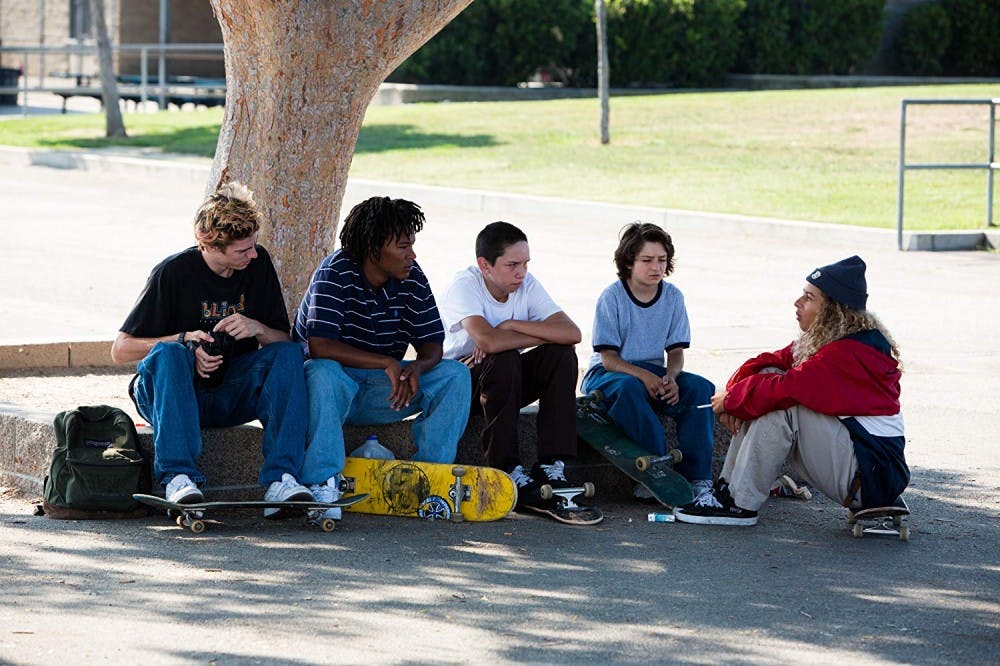Jonah Hill is a guy who’s been, very much in the vein of a Vince Vaughan or Steve Carrell, building himself up as a great comedic actor while also being a dark horse for the “talented dramatic” type. So when it was announced what Hill’s directorial debut would be, there were of course some raised eyebrows.
Could Hill really prove his directorial chops on a coming-of-age drama based in, of all things, skateboard culture?
It sounds a bit out of left field, but what Hill gives us with "Mid90s" is one of those movies that is solely concerned on bringing the audience into a singular frame of life and an aspect of youth culture that is rarely explored in film.
The film revolves around a boy named Stevie, played by Sunny Suljic, who lives in Los Angeles during the time period for which the film is named. He lives with his mother Dabney, played by Katherine Waterson, and his older brother Ian, played by Lucas Hedges.
One day while biking through the city, Stevie comes across a group of skateboarders and quickly takes to idolizing them. Eventually, he even becomes friends with the group of misfits and learns about skate culture, filmmaking and even the value of his own life compared to theirs.
"Mid90s" very much takes its time in establishing what it’s trying to go for, and a lot of that lies in Hill’s direction. The way he frames every shot feels equally cinematic and mundane, as if it’s simply another story that happens to be made as a movie. It’s a bold choice and doesn’t always land thoroughly, but it at least feels interesting for a debut.
He also does a great job at getting interesting performances out of his cast, many of whom (particularly the skate crew) are first-time actors. Suljic is a big standout, carrying the weight of the society he comes from, but Hill oddly never makes him sympathetic.
There are many points in the movie where we find the character of Stevie incredibly unlikable, and it’s a credit to Suljic’s performance that you continue to feel invested in his life.
The skaters each have a part to play, and they all make some sort of impression on the main character. The scenes with them together have a hypnotic sense to them, essentially bringing the audience intimately close to the lives of these kids.
Some of them are there to hopefully make a living off the sport, but for some skateboarding is just a relief from the struggles that they face, and that’s where Stevie finds his solace.
I have to give special praise to Na-kel Smith who plays the leader of the skaters Ray and the character I grew most attached to. He brings a sense of wisdom — at least in an adolescent sense — that feels oddly pure considering the context of where it comes from.
The film isn’t without its imperfections, the least of which being Stevie’s family. Hedges and Waterson are both incredibly talented performers and are given just enough to be compelling within the context of Stevie’s story, but not necessarily enough to be compelling on their own.
There are several scenes where we get hints of the mother's backstory or the origin of the brothers rage toward Stevie, but they’re often passed over in favor of simplistic sibling rivalry or an overprotective parent relationship that doesn't feel as emotional as it should.
There’s an argument to be made that this is to leave the focus on Stevie since his family doesn’t necessarily partake in the same passions he does, but it does feel like an oversight that leaves some parts of the film hollow.
In a bit of hit and miss, the soundtrack and score don’t necessarily mesh well together. On the one hand Trent Reznor and Atticus Ross’ score is ambient and dreamlike as usual and makes for a compelling addition, especially in the skate scenes.
The soundtrack seems to go in every direction other than where the score goes. Artists like Wu-Tang Clan and Nirvana work fine, but using music like The Mamas and The Papas simply feels like an excuse to include well-known artists and forgo the composer (which is irksome when it’s a team like Reznor and Ross doing the music).
The problems with "Mid90s" are found within Hill’s abilities as a first-time director, including the technical mood, supporting cast, etc., but where it succeeds is giving a touching coming-of-age story with a great sense of aesthetic, comedic timing and engaging characters. If this is where Hill wants start his directing career, it’s not a bad start and I think there’s definitely an audience for it.
Overally, I give "Mid90s" a rating of 7.5/10 stars.
Reach the reporter at brandon.D.King@asu.edu or follow @TheMovieKing45 on Twitter.
Like The State Press on Facebook and follow @statepress on Twitter.




